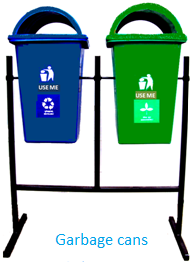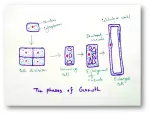Going Green
Going green is important in our day to day life. We live in a flat. It is part of a large complex of flats. We have many friends there. We all want to keep their homes clean and beautiful. To keep our homes clean we need to follow some rules.
In even- home, we use food, clothes, paper and other things. We need to buy many things to survive. We need to buy fruit and vegetables, rice, dais and spices. We also need to buy biscuits, sweets and other food items.
Some of these are sold in sealed packets. When we open them, we have to throw away the bags and wrappers. These may be made of paper, plastic or other materials. All this stuff is called garbage.
To keep our housing complex clean and green we should follow certain rules.
We separate the garbage we throw away into different lots like this:
Vegetable and fruit peels, tea leaves and left-over food.
Glass bottles, old newspapers, cardboard.
Plastic bottles and bags.
The first group is made of stuff that will decay if it is buried in the soil. It is collected separately from the flats and put into a pit. At the bottom of this pit, there is some soil and lots of earthworms. Everyday, these earthworms enjoy their treat of garbage which they can eat! They turn this wet garbage into compost. For this reason, earthworms are often called the "farmer's friend”. The compost made by them is very good for plants. Gardeners use it to keep the complex lawns green.
Material that will decay is called biodegradable. In many big cities, there are huge pits where waste materials are buried. These pits are called landfills. The wastes may be non-biodegradable or biodegradable. Tractors are used to push the material down. This is done often. Slowly, the layers at the bottom turn hard and new land is built up.
Some garbage items can be reused or recycled. The glass bottles and paper are often sold. The glass bottles can be broken and made into new glass. Similarly the paper can be made into a pulp and changed into other kinds of paper.
However, there is a major problem with anything made of plastic. Even if plastic is buried for many years it does not decompose or break up into any other materials. For this reason, we should reduce the number of plastic bags we use!
In many big cities, we can see garbage cans
like these.
The green one is labeled "biodegradable". The blue one is labeled "recyclable".
Recent Articles
-
Explain about Growth in Plants |Definition of Growth & Differentiation
Feb 27, 25 02:07 PM
Growth is a permanent increase in length or volume of an organism that brought upon by an increase in its dimensions due to synthesis of new protoplasmic material. -
Definition of Respiratory Quotient | calculation | Application | Plant
Dec 02, 24 12:09 AM
Definition of respiration quotient- the ratio of the carbon-dioxide evolved to that of the oxygen consumed by a cell, tissue, plants or animals in a given time is called respiratory quotient. It is us… -
Amphibolic Pathway | Definition | Examples | Pentose Phosphate Pathway
Jun 06, 24 10:40 AM
Definition of amphibolic pathway- Amphibolic pathway is a biochemical pathway where anabolism and catabolism are both combined together. Examples of amphibolic pathway- there are different biochemical… -
Respiratory Balance Sheet | TCA Cycle | ATP Consumption Process
Feb 18, 24 01:56 PM
The major component that produced during the photosynthesis is Glucose which is further metabolised by the different metabolic pathways like glycolysis, Krebs cycle, TCA cycle and produces energy whic… -
Electron Transport System and Oxidative Phosphorylation | ETC |Diagram
Feb 04, 24 01:57 PM
It is also called ETC. Electron transfer means the process where one electron relocates from one atom to the other atom. Definition of electron transport chain - The biological process where a chains…





New! Comments
Have your say about what you just read! Leave me a comment in the box below.